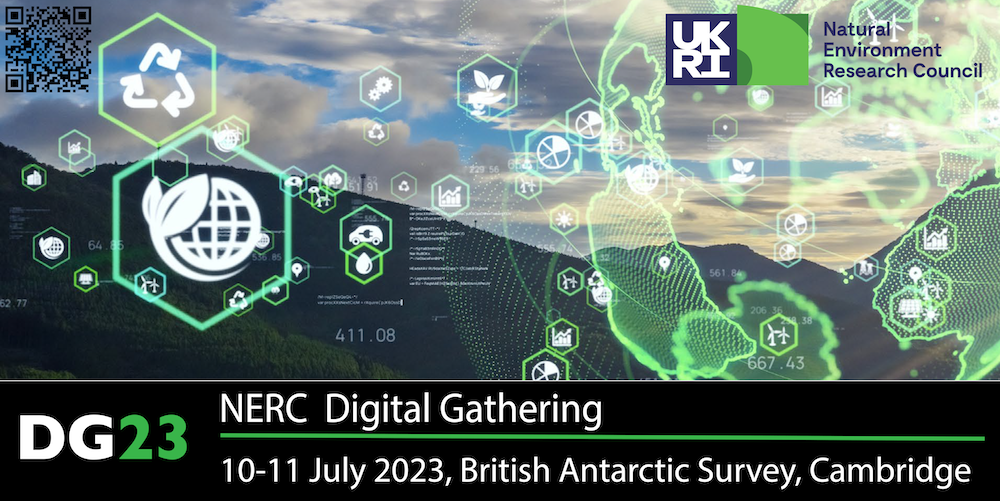
Recordings of all the presentations at #DG23 are now available. Open the Programme via the green button above and select the YouTube link next to each of the presentations.
NERC’s “Digital Gathering 23′ (#DG23) brought together the NERC research community to highlight the increasing role of digital technologies in environmental research, including spotlighting the outcomes from the Digital Environment Projects, which explored methodologies and tools for assessing, analysing, monitoring and forecasting the state of the natural environment at higher spatial and temporal resolutions than previously possible, and the activities of the Digital Environment Expert network. The conference goals were to spark new collaborations, new ideas and innovative approaches to utilising technology and digital resources in environmental research.
#DG23, was held from 10th to 11th July 2023 at the British Antarctic Survey, Cambridge. The conference sought to spotlight activities interlinking technology and advancing environmental understanding across the following themes:

Theme 1: Next-generation sensing
Theme 2: Data science tools and techniques


Theme 3: Environmental data – collection and governance
Theme 4: Building Confidence and trust, people and skills

Featuring:


- Keynote speakers:
- Dr. Emily Lines, Assistant Professor in the Department of Geography, University of Cambridge, a Turing Fellow and a UKRI Future Leaders Fellow
- Dr Scott Hosking, British Antarctic Survey and the Alan Turing Institute, Leader in Environmental Artificial Intelligence (AI)
- Workshop masterclasses on aspects of environmental data science in practice. See more details in conference programme page.
- Spotlight on Science (10 minute talks from fellows and CDE Expert Network members)
- Poster exhibition – prize (£50 Amazon voucher) for best poster
- Oral presentation – prize (£100 Amazon voucher for 20 min Oral; £50 Amazon voucher for best 10 min Spotlight talk) for best oral presentation
FREE TO ATTEND!
The conference was sponsored by the Natural Environment Research Council (NERC). To encourage maximum participation by researchers in the field and stakeholders there was no registration or abstract submission fee, lunch and refreshments was provided. For NERC-funded PhD students who were unable to cover the travel and accommodation costs through their project, DTP or CDT, limited support was made available, noted when registering.
Location:
The conference venue was the British Antarctic Survey, located at High Cross, Madingley Rd, Cambridge CB3 0ET. See https://www.bas.ac.uk/about/contact-bas for location details.
Transport advice:
The venue is just a short walk from the Madingley Park and Ride car park, the best place to leave your vehicle if driving. Cambridge train station has regular links to London and the National Express bus station is nearby in the town in Parker’s Piece (CB1 1PN).
The location is marked on the University of Cambridge online map.
Suggested Accommodation:
There is a variety of accommodation nearby to the conference venue, and only a short walk away. The Hyatt Centric Cambridge and the Turing Locke, Eddington hotels, and beyond them the Premier Inn Cambridge North (Girton) hotel for example. There are also many options open to stay in University rooms.
Download the conference poster. 
